 Sailor Saturn & Sailor Moon in “The Shining Shooting Star: Saturn and the Messiah,” Sailor Moon S (February 11, 1995)
Sailor Saturn & Sailor Moon in “The Shining Shooting Star: Saturn and the Messiah,” Sailor Moon S (February 11, 1995)
“Indeed, some of us did not die. And what shall we do, we who did not die?”
____________“The past is never dead. It is not even past.”
_______________What do you got to offer?
Tell me before you we off ya, put you deep in the coffin
Been allergic to talkin’, been aversion to bullshit
Instead of dreamin’ the auction, tell me just who your boss is
Niggas be fugazie, bitches be fugazie
This is for fugazie niggas and bitches who make habitual line babies, bless them little hearts
You can never persuade me[…]
You ain’t gotta lie to kick it, my nigga
You ain’t gotta lie, you ain’t gotta lie
You ain’t gotta lie to kick it, my nigga
You ain’t gotta try so hard
Studying history is a large part of my self-care. It helps me make sense of my current moment and humanity. Finding Ida B. Well’s story, in her own words, liberated me from years of institutional self-hatred and fear that dehumanization, neglect, and despair is totalizing. Perhaps my practice is analogous to an astrologer: my knowledge acts like an oracle. I come to it over and over again.
And like horoscopes, history is of a piece of knowledge. Like I said, it is not totalizing. History is not prescriptive.
We live in trying times, and institutions are failing us. It is disorienting to read that the choice to bring a child into the world is more likely not to be mine. Instead, I am more likely to die because of preventable disease because medical institutions in the U.S. hate black women. The tax bill will make any little wealth folks have accumulated into zero or worse. QTPOC are dying, their families are being ripped apart by the state. This is the tip of the iceberg when the rest of the world comes into view, but every sheet of ice is nauseating and potentially fatal. It is demoralizing and penetrates our wellbeing as a spear drives into a heart.
The elders will tell us that we are not doomed.
History, and the knowledge it provides, is not a linear track of eternal progress. Progress and justice are not guaranteed in any particular moment. Progress and justice are projects, and they are propelled forward by each generation, who pass the baton to the next generation when the previous one is ready to pass on into the larger universe. You are tired of race metaphors, but they are apt: our work for liberation, justice, and peace is a marathon, not a sprint. Pace yourself and do not work yourself to an early death.
If history is not prescriptive, but is still medicine, it is joined by other health practices. You do not take medicine by itself: the doctor and pharmacist suggest other forms of relief to join your recovery efforts: sleep, nutritious food, plenty of fluids, exercise, and leisure to rest your mind. In many cultures, people seek out traditional forms of wellness and medicine, and tap into those practices simultaneously with Western medicine.
While history is not prescriptive, it can guide us. It has lessons and insights. There is terror and destruction, but even within that bleakness there is hope. People created and embodied joy to survive; to give birth to hope that traveled and continues to travels across time and space. This is one of the many blessings from the ancestors. It is also a reminder that institutions never had our backs, but we retained and improved on ways to maintain our wellbeing as best we could without them. I have been calling on elders and ancestors. Recently, my grandmother has come to meet me in my dreams. She comes as she likes, but it is always to bring back an abundance of warmth, compassion, wisdom, joy, and safety. She reminds me of where I am, and where I will be. That I will be victorious in life and death.
We have some tools. Our families (bio or chosen), our communities, mentors and mentees, our wellness practices, the elders, and our ourselves. We have ourselves.
Our hope remains within us, and our communities maintain our spirit. When both are gone, we perish.
Hope is a practice.
Care is a practice.
Justice is a practice.
Remember death. Remember community, present and passed on.
Mark Aguhar (February 17, 2012)
I plan to write more about this. In the meantime, the oracle provides resources:
– Alexis Pauline Gumbs, “We Can Learn to Mother Ourselves: The Queer Survival of Black Feminism 1968-1996,” Dissertation.
– Still Processing (Jenna Wortham & Wesley Morris): “We Care for Ourselves and Others in Trump’s America;” “Black Health Matters”
– Audre Lorde, ‘Introduction‘ from the Cancer Journals (1980)
– Evette Dionne, “Audre Lorde Thought of Self-Care as an ‘Act of Political Warfare,'” Bitch (February 18, 2016)
– Start with “Latham Thomas,” “Ashlee Marie Preston,”Melody Ehsani,” and “dream hampton” on Erica Williams Simon‘s the Call. Then listen to the rest of the first and second seasons.
– James Cone: “the Cross and the Lynching Tree,” Bill Moyers Journal (November 23, 2007)
– Khalil Gibran Muhammad: “Confronting the Contradictions of America’s Past,” Moyers & Company (June 29, 2012)
– Kendrick Lamar: “You Ain’ Gotta Lie (Momma Said),” To Pimp A Butterfly (March 15, 2015)
– Alexander Weheliye, Habeas Viscus: Racializing Assemblages, Biopolitics, and Black Feminist Theories of the Human (2014) & “Black Life”



Brief Retrospective: 2017 A.D. – super relax.
-[…] perhaps the definition cut short for “rise from adversity” is the “ability to do deep inner processing without sinking to the pit of self-aggrandizing despair.” If that is what it is, then maybe […]